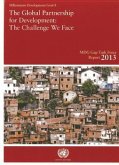William Gay, T A Alekseeva
Capitalism with a Human Face
The Quest for a Middle Road in Russian Politics
William Gay, T A Alekseeva
Capitalism with a Human Face
The Quest for a Middle Road in Russian Politics
- Broschiertes Buch
- Merkliste
- Auf die Merkliste
- Bewerten Bewerten
- Teilen
- Produkt teilen
- Produkterinnerung
- Produkterinnerung
Combining the theoretical perspectives of a leading Russian political scientist and an American political philosopher who have collaborated for years, Capitalism with a Human Face analyzes the relation between economics and politics in Russia as it moves toward modernization. Throughout the book, the authors contrast Western media accounts of the Russian situation with less accessible but more relevant data gathered in Russia since 1991. They advocate a new notion of centrism for Russia: one that combines democratic politics and a market economy without abandoning the social guarantees on…mehr
Andere Kunden interessierten sich auch für
![Managing Water Quality in the Face of Uncertainty Managing Water Quality in the Face of Uncertainty]() Jordan R FischbachManaging Water Quality in the Face of Uncertainty42,99 €
Jordan R FischbachManaging Water Quality in the Face of Uncertainty42,99 €![The Changing Face of the U.S. Politics The Changing Face of the U.S. Politics]() Jack BarnesThe Changing Face of the U.S. Politics21,99 €
Jack BarnesThe Changing Face of the U.S. Politics21,99 €![Millennium Development Goals Gap Task Force Report 2013 Millennium Development Goals Gap Task Force Report 2013]() Millennium Development Goals Gap Task Force Report 201318,99 €
Millennium Development Goals Gap Task Force Report 201318,99 €![Face Recognition Technologies Face Recognition Technologies]() Douglas YeungFace Recognition Technologies35,99 €
Douglas YeungFace Recognition Technologies35,99 €![Through a Mirror Darkly: The Face of Future War, 1871-2005 - War College Series Through a Mirror Darkly: The Face of Future War, 1871-2005 - War College Series]() Richard J. NortonThrough a Mirror Darkly: The Face of Future War, 1871-2005 - War College Series17,99 €
Richard J. NortonThrough a Mirror Darkly: The Face of Future War, 1871-2005 - War College Series17,99 €![Biometric Identifiers and the Modern Face of Terror: New Technologies in the Global War on Terrorism - War College Series Biometric Identifiers and the Modern Face of Terror: New Technologies in the Global War on Terrorism - War College Series]() Biometric Identifiers and the Modern Face of Terror: New Technologies in the Global War on Terrorism - War College Series21,99 €
Biometric Identifiers and the Modern Face of Terror: New Technologies in the Global War on Terrorism - War College Series21,99 €![Politics: The Real Face of Our Leaders Politics: The Real Face of Our Leaders]() Frank VervoortPolitics: The Real Face of Our Leaders17,99 €
Frank VervoortPolitics: The Real Face of Our Leaders17,99 €-
-
-
Combining the theoretical perspectives of a leading Russian political scientist and an American political philosopher who have collaborated for years, Capitalism with a Human Face analyzes the relation between economics and politics in Russia as it moves toward modernization. Throughout the book, the authors contrast Western media accounts of the Russian situation with less accessible but more relevant data gathered in Russia since 1991. They advocate a new notion of centrism for Russia: one that combines democratic politics and a market economy without abandoning the social guarantees on which many Russians have long relied and without which their political and economic life is likely to remain in turmoil. This will be an important work for scholars and students of social and political philosophy, international relations, comparative politics, and economics.
Hinweis: Dieser Artikel kann nur an eine deutsche Lieferadresse ausgeliefert werden.
Hinweis: Dieser Artikel kann nur an eine deutsche Lieferadresse ausgeliefert werden.
Produktdetails
- Produktdetails
- Verlag: Globe Pequot Publishing Group Inc/Bloomsbury
- Seitenzahl: 232
- Erscheinungstermin: 23. Januar 1996
- Englisch
- Abmessung: 228mm x 150mm x 15mm
- Gewicht: 358g
- ISBN-13: 9780847681365
- ISBN-10: 084768136X
- Artikelnr.: 38492062
- Herstellerkennzeichnung
- Libri GmbH
- Europaallee 1
- 36244 Bad Hersfeld
- 06621 890
- Verlag: Globe Pequot Publishing Group Inc/Bloomsbury
- Seitenzahl: 232
- Erscheinungstermin: 23. Januar 1996
- Englisch
- Abmessung: 228mm x 150mm x 15mm
- Gewicht: 358g
- ISBN-13: 9780847681365
- ISBN-10: 084768136X
- Artikelnr.: 38492062
- Herstellerkennzeichnung
- Libri GmbH
- Europaallee 1
- 36244 Bad Hersfeld
- 06621 890
William Gay is Associate Professor of Philosophy at the University of North Carolina-Charlotte. T. A. Alekseeva is Chair of the Department of Political Philosophy at the Institute of Philosophy in Moscow and Chair of the Department of Political Science at Moscow State Linguistic University. Together, they are the editors of On the Eve of the 21st Century: Perspectives of Russian and American Philosophers (1994, Rowman & Littlefield).
Chapter 1 Introduction: Today's Russia Needs Capitalism with a Human Face
Chapter 2 Past and Present Forms of Russian Extremism Chapter 3 Russian
Confusion Regarding Democracy Chapter 4 The Limitation of Russia's
Democratic Intellectuals Chapter 5 The Alternative of Russian Centrism Part
6 Part I: Economy and Politics Chapter 7 Recent Russia's Economic and
Political History Chapter 8 Russia's New Economic System. Russia's New
Political System Chapter 9 The State and Political Stability Chapter 10 The
Role of Paternalism in Political Philosophy Chapter 11 Russian Paternalism
and Authoritarianism Chapter 12 Political Stability and the New Russian
Elite Chapter 13 Past, Present, and Future Russian State Systems Chapter 14
Models for a Mixed Economy Chapter 15 Market Systems, Command Systems, and
Mixed Systems Chapter 16 The Self-Interest of Russian Manufactures Chapter
17 The Need for a Broader Conception of Russian Interest Chapter 18 The
Need to Resist Failed Soviet Methods Part 19 Part II: Consciousness and
Class Chapter 20 Current Russian Consciousness and Philosophical Discourse
Chapter 21 The Impact of the Disintegratin of the Soviet Union Chapter 22
The Transition to a Russian Consciousness Chapter 23 The Status of Imperial
and Patriotic Elements in Russian Consciousness Chapter 24 Inequality and
the Resurgence of Neo-Bolshevism Chapter 25 The Main Trends in Russian
Public Opinion Chapter 26 More Recent Shifts in Attitudes Chapter 27 The
Quest for a New Paradigm in Social Theory Chapter 28 The Identify and
Prospect of the Current Russian Middle Class Chapter 29 The Historical
Development of Russian Classes and Intelligentsia Chapter 30 Difficulties
in Identifying the Middle Class in Russia Chapter 31 The Current Primacy of
Political Affiliation over Social Class Chapter 32 The Lingering Influence
of Marxism-Leninism and Russian Extremism Chapter 33 The Prospects for
Cultivating Centrist Attitudes Chapter 34 Public Resistance to and
Misunderstandings of Centrism Recent Projections Concerning the Russian
Middle Class Part 35 Part III: Centrism Chapter 36 The Emergence and Future
of Parties of the Center Chapter 37 Current Analyses of Russia's Political
Parties and Ideologies Chapter 38 The West's Threefold Classification of
Russia's Political Groups Chapter 39 The Six Primary Political Groups in
Russia Today Chapter 40 Russia's Social Democrats Before and After the Coup
Chapter 41 The Recent Emergence of Political Clubs Chapter 42 The Status
and Prospects of Centrism in Russia Chapter 43 Deficiencies of the Soviet
System Chapter 44 The Unprofessionalism of the Transitional Leaders Chapter
45 Rising Popularity of Centrist Candidates Chapter 46 The Broadening
Acceptance of Centrist Values Chapter 47 Political Blocs in the State Duma
and Trends in Regional Elections Chapter 48 Obstacles Still Facing Centrism
Chapter 49 The Prospects for "Capitalism with a Human Face" Chapter 50
Conclusion: Toward Russian Capitalism with Social Guarantees and Democracy
Chapter 51 The Case for Social Guarantees Chapter 52 Post-Keynesian
Economic Liberalism Chapter 53 From Paternalism to Partnership Chapter 54
Bibliography Chapter 55 Index
Chapter 2 Past and Present Forms of Russian Extremism Chapter 3 Russian
Confusion Regarding Democracy Chapter 4 The Limitation of Russia's
Democratic Intellectuals Chapter 5 The Alternative of Russian Centrism Part
6 Part I: Economy and Politics Chapter 7 Recent Russia's Economic and
Political History Chapter 8 Russia's New Economic System. Russia's New
Political System Chapter 9 The State and Political Stability Chapter 10 The
Role of Paternalism in Political Philosophy Chapter 11 Russian Paternalism
and Authoritarianism Chapter 12 Political Stability and the New Russian
Elite Chapter 13 Past, Present, and Future Russian State Systems Chapter 14
Models for a Mixed Economy Chapter 15 Market Systems, Command Systems, and
Mixed Systems Chapter 16 The Self-Interest of Russian Manufactures Chapter
17 The Need for a Broader Conception of Russian Interest Chapter 18 The
Need to Resist Failed Soviet Methods Part 19 Part II: Consciousness and
Class Chapter 20 Current Russian Consciousness and Philosophical Discourse
Chapter 21 The Impact of the Disintegratin of the Soviet Union Chapter 22
The Transition to a Russian Consciousness Chapter 23 The Status of Imperial
and Patriotic Elements in Russian Consciousness Chapter 24 Inequality and
the Resurgence of Neo-Bolshevism Chapter 25 The Main Trends in Russian
Public Opinion Chapter 26 More Recent Shifts in Attitudes Chapter 27 The
Quest for a New Paradigm in Social Theory Chapter 28 The Identify and
Prospect of the Current Russian Middle Class Chapter 29 The Historical
Development of Russian Classes and Intelligentsia Chapter 30 Difficulties
in Identifying the Middle Class in Russia Chapter 31 The Current Primacy of
Political Affiliation over Social Class Chapter 32 The Lingering Influence
of Marxism-Leninism and Russian Extremism Chapter 33 The Prospects for
Cultivating Centrist Attitudes Chapter 34 Public Resistance to and
Misunderstandings of Centrism Recent Projections Concerning the Russian
Middle Class Part 35 Part III: Centrism Chapter 36 The Emergence and Future
of Parties of the Center Chapter 37 Current Analyses of Russia's Political
Parties and Ideologies Chapter 38 The West's Threefold Classification of
Russia's Political Groups Chapter 39 The Six Primary Political Groups in
Russia Today Chapter 40 Russia's Social Democrats Before and After the Coup
Chapter 41 The Recent Emergence of Political Clubs Chapter 42 The Status
and Prospects of Centrism in Russia Chapter 43 Deficiencies of the Soviet
System Chapter 44 The Unprofessionalism of the Transitional Leaders Chapter
45 Rising Popularity of Centrist Candidates Chapter 46 The Broadening
Acceptance of Centrist Values Chapter 47 Political Blocs in the State Duma
and Trends in Regional Elections Chapter 48 Obstacles Still Facing Centrism
Chapter 49 The Prospects for "Capitalism with a Human Face" Chapter 50
Conclusion: Toward Russian Capitalism with Social Guarantees and Democracy
Chapter 51 The Case for Social Guarantees Chapter 52 Post-Keynesian
Economic Liberalism Chapter 53 From Paternalism to Partnership Chapter 54
Bibliography Chapter 55 Index
Chapter 1 Introduction: Today's Russia Needs Capitalism with a Human Face
Chapter 2 Past and Present Forms of Russian Extremism Chapter 3 Russian
Confusion Regarding Democracy Chapter 4 The Limitation of Russia's
Democratic Intellectuals Chapter 5 The Alternative of Russian Centrism Part
6 Part I: Economy and Politics Chapter 7 Recent Russia's Economic and
Political History Chapter 8 Russia's New Economic System. Russia's New
Political System Chapter 9 The State and Political Stability Chapter 10 The
Role of Paternalism in Political Philosophy Chapter 11 Russian Paternalism
and Authoritarianism Chapter 12 Political Stability and the New Russian
Elite Chapter 13 Past, Present, and Future Russian State Systems Chapter 14
Models for a Mixed Economy Chapter 15 Market Systems, Command Systems, and
Mixed Systems Chapter 16 The Self-Interest of Russian Manufactures Chapter
17 The Need for a Broader Conception of Russian Interest Chapter 18 The
Need to Resist Failed Soviet Methods Part 19 Part II: Consciousness and
Class Chapter 20 Current Russian Consciousness and Philosophical Discourse
Chapter 21 The Impact of the Disintegratin of the Soviet Union Chapter 22
The Transition to a Russian Consciousness Chapter 23 The Status of Imperial
and Patriotic Elements in Russian Consciousness Chapter 24 Inequality and
the Resurgence of Neo-Bolshevism Chapter 25 The Main Trends in Russian
Public Opinion Chapter 26 More Recent Shifts in Attitudes Chapter 27 The
Quest for a New Paradigm in Social Theory Chapter 28 The Identify and
Prospect of the Current Russian Middle Class Chapter 29 The Historical
Development of Russian Classes and Intelligentsia Chapter 30 Difficulties
in Identifying the Middle Class in Russia Chapter 31 The Current Primacy of
Political Affiliation over Social Class Chapter 32 The Lingering Influence
of Marxism-Leninism and Russian Extremism Chapter 33 The Prospects for
Cultivating Centrist Attitudes Chapter 34 Public Resistance to and
Misunderstandings of Centrism Recent Projections Concerning the Russian
Middle Class Part 35 Part III: Centrism Chapter 36 The Emergence and Future
of Parties of the Center Chapter 37 Current Analyses of Russia's Political
Parties and Ideologies Chapter 38 The West's Threefold Classification of
Russia's Political Groups Chapter 39 The Six Primary Political Groups in
Russia Today Chapter 40 Russia's Social Democrats Before and After the Coup
Chapter 41 The Recent Emergence of Political Clubs Chapter 42 The Status
and Prospects of Centrism in Russia Chapter 43 Deficiencies of the Soviet
System Chapter 44 The Unprofessionalism of the Transitional Leaders Chapter
45 Rising Popularity of Centrist Candidates Chapter 46 The Broadening
Acceptance of Centrist Values Chapter 47 Political Blocs in the State Duma
and Trends in Regional Elections Chapter 48 Obstacles Still Facing Centrism
Chapter 49 The Prospects for "Capitalism with a Human Face" Chapter 50
Conclusion: Toward Russian Capitalism with Social Guarantees and Democracy
Chapter 51 The Case for Social Guarantees Chapter 52 Post-Keynesian
Economic Liberalism Chapter 53 From Paternalism to Partnership Chapter 54
Bibliography Chapter 55 Index
Chapter 2 Past and Present Forms of Russian Extremism Chapter 3 Russian
Confusion Regarding Democracy Chapter 4 The Limitation of Russia's
Democratic Intellectuals Chapter 5 The Alternative of Russian Centrism Part
6 Part I: Economy and Politics Chapter 7 Recent Russia's Economic and
Political History Chapter 8 Russia's New Economic System. Russia's New
Political System Chapter 9 The State and Political Stability Chapter 10 The
Role of Paternalism in Political Philosophy Chapter 11 Russian Paternalism
and Authoritarianism Chapter 12 Political Stability and the New Russian
Elite Chapter 13 Past, Present, and Future Russian State Systems Chapter 14
Models for a Mixed Economy Chapter 15 Market Systems, Command Systems, and
Mixed Systems Chapter 16 The Self-Interest of Russian Manufactures Chapter
17 The Need for a Broader Conception of Russian Interest Chapter 18 The
Need to Resist Failed Soviet Methods Part 19 Part II: Consciousness and
Class Chapter 20 Current Russian Consciousness and Philosophical Discourse
Chapter 21 The Impact of the Disintegratin of the Soviet Union Chapter 22
The Transition to a Russian Consciousness Chapter 23 The Status of Imperial
and Patriotic Elements in Russian Consciousness Chapter 24 Inequality and
the Resurgence of Neo-Bolshevism Chapter 25 The Main Trends in Russian
Public Opinion Chapter 26 More Recent Shifts in Attitudes Chapter 27 The
Quest for a New Paradigm in Social Theory Chapter 28 The Identify and
Prospect of the Current Russian Middle Class Chapter 29 The Historical
Development of Russian Classes and Intelligentsia Chapter 30 Difficulties
in Identifying the Middle Class in Russia Chapter 31 The Current Primacy of
Political Affiliation over Social Class Chapter 32 The Lingering Influence
of Marxism-Leninism and Russian Extremism Chapter 33 The Prospects for
Cultivating Centrist Attitudes Chapter 34 Public Resistance to and
Misunderstandings of Centrism Recent Projections Concerning the Russian
Middle Class Part 35 Part III: Centrism Chapter 36 The Emergence and Future
of Parties of the Center Chapter 37 Current Analyses of Russia's Political
Parties and Ideologies Chapter 38 The West's Threefold Classification of
Russia's Political Groups Chapter 39 The Six Primary Political Groups in
Russia Today Chapter 40 Russia's Social Democrats Before and After the Coup
Chapter 41 The Recent Emergence of Political Clubs Chapter 42 The Status
and Prospects of Centrism in Russia Chapter 43 Deficiencies of the Soviet
System Chapter 44 The Unprofessionalism of the Transitional Leaders Chapter
45 Rising Popularity of Centrist Candidates Chapter 46 The Broadening
Acceptance of Centrist Values Chapter 47 Political Blocs in the State Duma
and Trends in Regional Elections Chapter 48 Obstacles Still Facing Centrism
Chapter 49 The Prospects for "Capitalism with a Human Face" Chapter 50
Conclusion: Toward Russian Capitalism with Social Guarantees and Democracy
Chapter 51 The Case for Social Guarantees Chapter 52 Post-Keynesian
Economic Liberalism Chapter 53 From Paternalism to Partnership Chapter 54
Bibliography Chapter 55 Index








